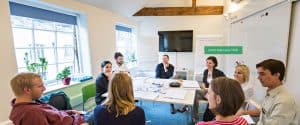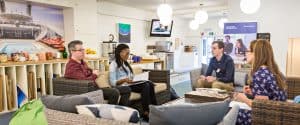
Written by Roy Gilmore Kerr, director of Wallacespace.
Businesses have had to adapt and innovate in order to survive. The global pandemic has encouraged business to embrace volatility head-on and the exponential growth of virtuality has been the obvious response. As Ian Stewart, Deloitte’s Chief UK Economist, says in his newsletter of 5/10/20, “the pandemic has created a vast natural experiment in homeworking. In the UK the proportion of the workforce regularly working from home (WFH) rose from about 5% to close to 50% by April. A recent Office for National statistics (ONS) survey found that almost 30% of working adults plan to continue working from home at least some of the time after the pandemic. The pandemic looks set to turbocharge the gradual shift to homeworking.”
Recent research by McKinsey (website 29/06/20) identified several key drivers that impacted employee engagement and performance:
– stable secure work experience
– trusting relationships
– social cohesion and inclusion
– individual purpose and contribution
McKinsey concluded that by being readily available and helping employees give meaning to a crisis, organisations can build employee resilience and social capital with their people.
By doing so they help connect employees to the organisation and one another and help enhance social connection and affiliation. Building social capital during the pandemic is likely to be beneficial post crisis.
Research by TOFAS Academy (website 31\08\20) asserts that building social capital is tough in volatile times and tougher still with many people working offsite.

Creating and maintaining a culture that values inclusion, individuality and social harmony can be a key component of competing with increasing global volatility and associated increase in virtuality.
Volatility may spawn opportunity and virtuality gives employees flexibility, but they both erode relationships and social capital.
In this world we need an office, or some version of it. Social capital grows when teams meet face-to-face and work side-by-side. As Ian Stewart of Deloitte concluded, “sectors have drawn down on the stock of knowledge, relationships and social capital that were built up in the workplace. In this world we need the office to renew these assets.“
Wallacespace has adapted during the crisis, enabling us to meet the needs of forward thinking companies by allowing them to invest in their relationships with employees and replace and build social capital. The reward will be greater employee engagement and effectiveness.
We now offer flexible, tech-smart, COVID-secure workspace with no long leases and no expensive landlords. A flexible, convenient version of your office in which teams can meet, reconnect and rebuild social capital.
We’ve also teamed up with digital specialists QPUK to offer live streaming, hybrid and fully virtual conferencing solutions, to allow you to connect seamlessly with those who can’t be with you face to face. To find out more go to https://www.wallacespace.com/hi-tech-meeting-spaces-in-london/
______
Deloitte on home working and the future of cities
Office for National Statistics on working from home
McKinsey on employee experience
Tofas Academy on investing in social capital
